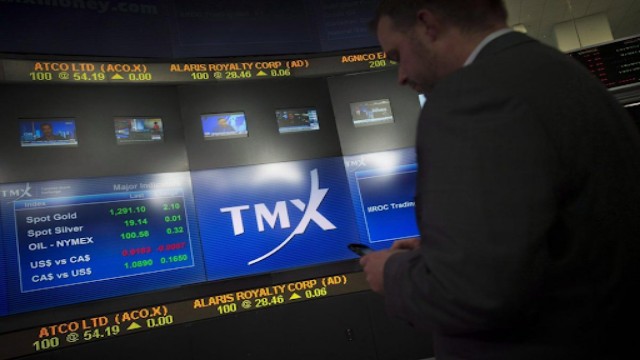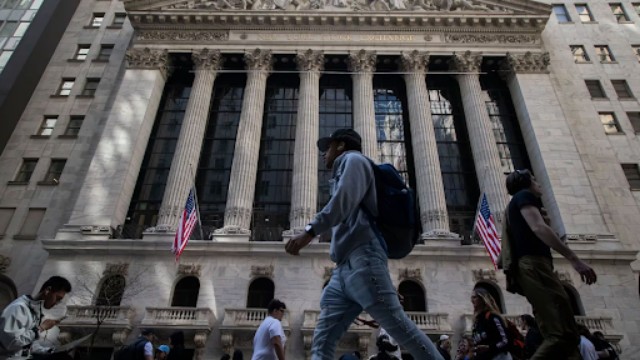
The TMX Group Ltd. broadcast center in Toronto’s financial district on Friday, May 9, 2014. Photo by Darren Calabrese/The Canadian Press
Canada’s main stock index soared on Thursday, gaining over 200 points, following fresh economic signals from the United States that boosted investor optimism. The S&P/TSX composite index climbed 205.03 points to close at 25,897.48, supported by strong performance in the industrial, telecommunications, and utilities sectors.
The boost came after a mixed batch of U.S. economic data was released. While the numbers weren’t entirely positive for the American economy, they pointed to a potential easing of inflation and a slowdown in consumer spending — signs that could prompt the U.S. Federal Reserve to cut interest rates later this year.
Anish Chopra of Portfolio Management Corp explained that slowing growth and cooling inflation in the U.S. often create a favourable environment for stock markets. “If the economy weakens and inflation drops, the Fed may feel confident enough to cut rates. That kind of scenario usually gives stock prices a lift,” Chopra noted.
A drop in interest rates is particularly beneficial for dividend-paying stocks, which are prominent in sectors like telecommunications and financial services. Investors looking for steady income often flock to these types of stocks when rates fall, contributing to the rise in the TSX.
South of the border, Wall Street also responded positively to the economic signals. The Dow Jones Industrial Average rose by 271.69 points to 42,322.75. The S&P 500 followed suit, climbing 24.35 points to 5,916.93. However, the Nasdaq composite dipped slightly by 34.49 points, settling at 19,112.32.
The data released on Thursday revealed several key trends. Wholesale prices in the U.S. dropped by 0.5% in April — the largest decline in five years and the first since October 2023 — according to the Producer Price Index. This indicates that inflation may be easing before it hits consumers. Meanwhile, retail sales and restaurant spending in April rose by only 0.1%, a sharp drop from March’s 1.7% increase. The earlier surge had been driven by Americans rushing to buy cars ahead of an expected 25% tariff on auto imports imposed by the Trump administration.
Despite a recent temporary truce between the U.S. and China on certain tariffs, trade tensions remain unresolved. Chopra warned that while optimism for a resolution exists, the ongoing tariff situation could still result in rising prices. Retail giant Walmart has already signalled price increases due to higher import costs and has avoided making any profit predictions for the upcoming quarter.
In other market updates, the Canadian dollar traded at 71.51 cents U.S., slightly lower than the previous day. Oil prices fell, with July crude down $1.53 to $61.15 per barrel. Natural gas slipped by 13 cents to $3.36 per mmBTU. Meanwhile, gold rose sharply by $38.30 to reach $3,226.60 an ounce, and copper prices ticked up three cents to $4.68 per pound.















